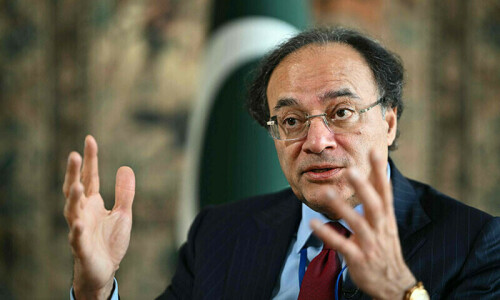ISLAMABAD: The International Monetary Fund (IMF) has cautioned that the entrenched nexus between the government, the central bank and the banking sector is detrimental to the country’s economy and financial sector, as this relationship can lead to conflicting policies, regulatory challenges and a debt-inflation trade-off.
In a special chapter in the IMF’s latest report on the country’s recently approved $7 billion Extended Fund Facility (EFF), the lender said Pakistan’s banking sector “holds the world’s largest proportion of government securities relative to its total assets”.
The banks in recent years have funded a significant part of their growing securities portfolios via short-term central bank liquidity using bonds as collateral in the wake of limited deposit growth. “This complex tripartite relationship means that developments or actions in one domain — fiscal, monetary, or banking — can have wide-ranging effects across the economy,” the IMF added.
The IMF observed that persistently high fiscal deficits, coupled with the impact of recent external shocks, have had significant implications for the sovereign-bank nexus in Pakistan.
Says sovereign-bank-SBP nexus detrimental to economy
With limited access to external funding, government debt has increasingly been taken up by the banking sector and, as a result, banks’ holdings of domestic government debt have surged to around 60 per cent of their assets, i.e., more than three times the average for emerging market economies.
With a limited depositor base, the banks have mainly financed the government’s additional demand for funds through liquidity provided by the State Bank of Pakistan (SBP) via open market operations (OMOs), the IMF said.
The lender earlier compelled the government to ban borrowing from the central bank and instead go to private banks, which practically now borrow from the central bank for onward lending to the government.
The IMF now highlighted that with government credit more attractive than private lending, this has significantly crowded out the latter. “Moreover, the balance sheets of the three parties, the sovereign (government), commercial banks and the central bank, have become highly interconnected,” it said, adding that it also significantly affected the strength of monetary policy transmission by impinging the relationship between policy rates, private credit and private investment and consumption decisions.
In an environment of high fiscal deficits, the sovereign’s exposure to high refinancing and interest repricing risks could add to concerns about public debt sustainability. Under a stress scenario, a vicious circle can start leading to diminished demand and capacity of banks to carry government securities, further shortening of maturities, rising interest rates, and eventually turmoil in the domestic debt market and the financial system, with complex implications for all parties involved.
Regarding the SBP, the IMF said it had dual responsibility: for monetary policy purposes, it had to manage liquidity in the financial system to influence the level of interest rates in line with its price stability objectives and play a regulatory and supervisory role over the banking sector.
“The Sovereign-Bank nexus may cause the SBP to face potential trade-offs in fulfilling its main functions,” it said, noting that there was now a systematic shortage of liquidity in the banking system, which the SBP should carefully manage.
The report noted that in recent years, the banking sector in Pakistan remained profitable by primarily focusing on financing the government’s fiscal deficit.
On top of that, the current banking landscape in Pakistan provided too little incentive to attract depositors as they had ample liquidity from the central bank.
Published in Dawn, October 12th, 2024















































Dear visitor, the comments section is undergoing an overhaul and will return soon.